Deviation Street: High Times In Ladbroke Grove 1967-1975, Various Artists (3CD, Grapefruit)
Trouble On Big Beat Street, Pere Ubu (CD, Cherry Red)
Silberland volume 2, Various Artists (Bureau B)
From A to B – The Sony Years, New Music (4CD, Cherry Red)
Sundown, Eddie Chacon (LP Stones Throw Records/Bandcamp)
Songs of Surrender, U2 (4CD, Island)
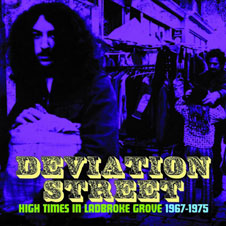
Back in the day, West London bohemia caused an eruption of psychedelic musicians and bands to emerge; the compilation Deviation Street attempts to capture that era in all its acid-fried glory. Quintessence kick things off, setting the scene with their ‘Notting Hill Gate’ single, swiftly followed by Hawkwind Zoo, who would later drop the Zoo bit from their name and become more electronic than their track here suggests. Amongst more famous names such as Family, Bodast, Tomorrow, Pink Fairies, The Pretty Things, Third Ear Band and Edgar Brougton Band’s – playing their delirious and unsettling ‘Out Demons Out’ – there are a myriad unknowns and (sometimes thankfully) forgotten acts jamming, chanting and upsetting the neighbours. By 1975 we get the arrival of the 101’ers, Motorhead and The Deviants, along with an early demo of Roxy Music and the splinters of Hawkwind after the original line-up imploded. It’s glorious stuff, harking back to an era before record labels ruled the world and yuppies took over Notting Hill and Holland Park.
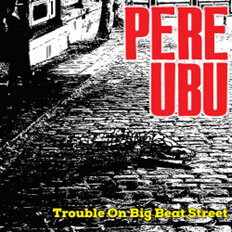
There’s a rebellious heart to Pere Ubu too, but they came out of industrial Cleveland rather than any hippy rebellion. David Thomas’ strange singing (think Captain Beefheart) and analogue synthesizers have always been central to their sound, and if the energy level has dropped since their early albums, the 17 new songs here on Trouble On Big Beat Street continue to use awkward sounds and textures, overlaid with singsong surrealism and burbling, shrieking keyboard sounds and guitar mannerisms hidden in the mix. The album was apparently constructed in the studio, as the band played the songs for the first time, since Thomas is convinced ‘that a song is best the first time it’s played. There is nothing that can go wrong or be inadequate. Repetition allows error to enter in.’ Whether this is true or not, the album has an edge throughout, from opener ‘Love is like Gravity’ to the closing ‘Goodnight’. En route it offers up delights such as ‘Moss Covered Boondoggie’, ‘Satan’s Hamster’ and ‘Worried Man Blues’. Easy listening it isn’t, but it’s intricate chugalong rhythms and structural looseness has continued to surprise and entrance since I first played it.
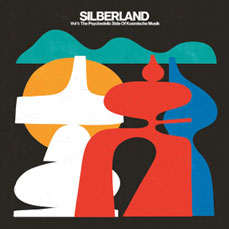
If you prefer your rhythms electronic and repetitive then I would point you towards Silberland volume 2: The Driving Sound of Kosmiche Music, the follow-up to the delightfully psychedelic collection that comprised volume 1. Here the rhythm is king, motoring along behind layers of groovy synthesizers, screaming guitars, noise machines and sequencers. I guess my only quibble would be that several of the tracks are edits by the record company, which have removed some of the lengthy trance-inducing developments much of this music featured. But despite my criticism the album offer’s up a smorgasbord of glorious electronica from the 1970s and 80s, motoring into the future at top speed.
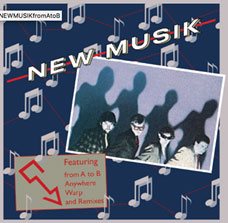
If one wanted to be unkind, one might hold krautrockers, along with the likes of Roxy Music, responsible for bands such as A Flock of Seagulls, Orchestral Manoeuvres in the Dark and New Musik, the pop end new wave and new romanticism, which mostly comprised people with really dodgy haircuts and dress sense playing cheap synthesizers with one finger. New Musik had a few hit singles and managed to release three albums in their career, the final one of which was apparently one of the first electronic albums recorded with digital samplers and emulators. True or not (the bit about it being one of the first, I mean) it doesn’t sound that much different from the previous two, and neither do the odds and sods b-sides and versions/remixes on the fourth CD. Personally I don’t find much here very new, and it’s hard to imagine that Cherry Red are going to shift many copies of this box set.
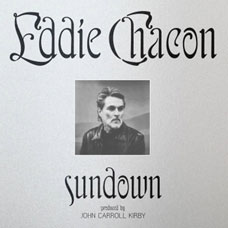
It’s with some relief I turn to Eddie Chacon’s new album, Sundown, his second solo album since the glory days of Charles and Eddie. If you like immaculately produced ‘celestial soul music’, often stripped back to lush simplicity accentuating plaintive, warm, sometimes tentative vocals you’ll love this. It’s 35 minutes of musical sunshine, 8 songs of gentle groove. Favoruites so far are the final two tracks, ‘Same Old Song’ with its soaring flute, and ‘The Morning Sun’, a slow-pulsing burner, with brass threatening to go freefrom throughout. It’s not often something so accomplished and enchanting comes along, and one has to question why Chacon is not signed to a major and the recipient of critical and popular acclaim.

Meanwhile, U2 have decided to re-record 40 of their early songs in a mostly low key acoustic style. They actually sound like a bad pub version of themselves, with lots of crooned and semi-spoken vocals, along with strummed acoustic guitar. If at times over the years we’ve all shouted at them for being too bombastic and preachy, without it there’s not much left. Goodness knows what they are surrendering to, but it feels like a big self-indulgent mistake.
Rupert Loydell
